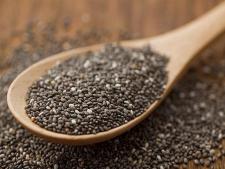-

chia seeds
| Food | Percentage of DRI per 100 grams | |
|---|---|---|
| magnesium | 108 | |
| phosphorus | 95 | |
| calcium | 63 | |
| zinc | 23 | |
| copper | 9 | |
| potassium | 5 | |
Chia seeds are small black or white seeds from Salvia Hispanica, a herb related to mint, originating in South America. Similar to flax and psyllium, chia seeds can absorb up to 12 times their weight in water, which makes them expand and become gelatinous. This means that they are both hydrating and filling. They can be used raw, soaked or cooked and are great for baked goods, granola, porridge, smoothies, crackers, puddings, smoothies, and drinks such as chia fresca
With remarkable levels of antioxidants, double the protein of any other seed or grain, and the best known plant based source of omega-3 fatty acids, it´s no wonder chia is so revered. This high-endurance seed is also a great source of minerals such as calcium, magnesium, zinc and iron. Chia seeds are 40% fiber, by weight, making them one of the best sources of fiber.
VOLUME
Quiet
HOW TO USE
Chia seeds can be eaten raw or cooked. Unlike flax seeds they don´t need to be ground before consuming. The taste of chia seeds is very mild, so they benefit greatly from added spices and seasonings. They have the ability to absorb both water-based and fat-based liquids, however they do need more time to absorb liquids with high fat content. Chia seeds can be used as a thickener for puddings, sauces and jams. They can also be used as an egg substitute in the same way as flax.
CHIA EGG
Recipe: Mix 1 tablespoon chia seeds (whole or ground) with 3 tablespoon water. Allow to soak for 10 minutes. Use as a binding agent in place of egg.
If you want an easy way to incorporate chia seeds into your diet, consider preparing overnight chia pudding ready for breakfast the next morning. Combine 2 tablespoons chia seeds with 1 ½ cups m!lk and optional fruits, berries, sweetener, spices and superfoods.
FLAVOR PAIRINGS
Almond extract, avocado, apples, bananas, berries, buckwheat, carob, chili, cacao, cinnamon, coconut, coconut oil, coconut sugar, coconut yogurt, dates, dried fruit, flax seeds, ginger, goji berries, hemp seeds, honey, ice, kale, kiwi, lemon, lime, maca, mango, maple syrup, m!lk, mint, nut butter, nutmeg, nuts, oatmeal, peaches, pears, pecans, pumpkin seeds, sesame seeds, spinach, quinoa, raisins, sage, sunflower seeds, vanilla, walnuts.
SELECTING
Nowadays both white and black chia seeds can be found in most grocery stores. Other places to look would be in your local health food stores or online. Most chia seeds are organic and GMO-free, but check the package to make sure.
STORING
The high amount of antioxidants in chia seeds extends their shelf life by preventing their delicate oil from going rancid. Therefore, chia seeds are much more shelf stable than flax and other seeds. Store in an airtight container in a cool, dark and dry place for up to 2 years. For extended shelf life, store in the refrigerator for up to 4 years. Ground chia can be stored in a cool, dark and dry pantry for up for 1 month or an airtight container in the refrigerator for up to 1 year.
Soaked chia seeds or chia pudding should be stored in the refrigerator up to 7 days depending on what liquid is used. If using nut m!lk your chia pudding might only last up to 3 days. Chia pudding also freezes well for up to 3 months. Freeze in portions and thaw in the refrigerator overnight.
SUBSTITUTIONS
Flax seeds can be substituted for chia in some recipes. For example when flax is used for binding or egg replacement in crackers, pancakes or breads you can use chia seeds instead.
HEALTH BENEFITS
Due to their high levels of omega-3 fatty acids, chia seeds are a great food for brain function, of specific benefit to memory, concentration and learning. Chia may also help prevent Alzheimer´s. The mineral content of chia seeds, especially calcium phosphorous and magnesium, makes them excellent for bone density. Chia seeds are also a great source of energy for for working out, increasing endurance and performance. Not only is chia one of the highest protein containing seed, but it is a complete protein, meaning it contains all of the essential amino acids.
Just like flax seeds, the fiber and mucilage in chia seeds can cleanse the colon by capturing and eliminating toxins, and greatly benefit the digestive tract by healing and soothing the gut lining and improve the absorption of nutrients.
Studies have shown chia seeds can lower LDL cholesterol which can lower the risk of heart disease, stroke and heart attack. Chia seeds are also very high in antioxidants which can prevent cancer. Their anti-inflammatory properties can also help improve symptoms of some conditions such as multiple sclerosis, rheumatoid arthritis, chronic fatigue and nerve pain. In a study of type 2 diabetes, chia seeds proved to stabilize blood sugar levels by helping to reduce blood sugar spikes after meals.
DOSE
Even though chia seeds are highly beneficial and nutrient dense, overconsumption is not recommended. A recommended amount is 2-4 tablespoons of chia seeds per day. If you are not used to eating a lot of fiber, too much can lead to an upset stomach. Start with a small amount and increase gradually. When eating fiber rich foods it is also recommended to drink plenty of water and other healthy liquids.
HISTORY
Legend has it that the Aztecs and Mayans used chia seeds for providing energy, strength and stamina to their warriors. In fact, chiais an ancient Mayan word forstrength. Although they date back so far, they didn´t become recognized as a superfood until very recently. In the past few years the interest for chia seeds has exploded as they have been recognized as a powerfood all over the world.